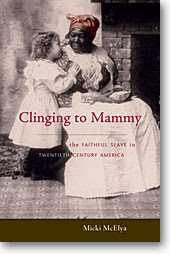
She applied the "Page 99 Test" to her new book, Clinging to Mammy: The Faithful Slave in Twentieth-Century America, and reported the following:
While the “quality of the whole” cannot be ascertained by reading only page 99 of Clinging to Mammy, it does elaborate an interesting aspect of one of the most surprising and heartbreaking histories in the book. The page falls within a chapter entitled “The Line Between Mother and Mammy” that details a 1917 custody case in Chicago in which the court removed a 14-year-old white girl named Marjorie Delbridge from the custody of her adoptive mother, Camilla Jackson, solely because Jackson was black and was raising Marjorie in a predominantly black neighborhood. The case became a tabloid news phenomenon splashed across the front pages of white and black-owned newspapers first in Chicago and then all around the region, becoming particularly heated when Marjorie disappeared from the home of a white couple who had been granted temporary custody.Read an excerpt from Clinging to Mammy and discover more about the book at the Harvard University Press website.
Page 99 details the efforts of that couple to locate Marjorie and one possible event that, along with her desire to be reunited with the only mother she had ever known, might have prompted the young women to flee:
“I have had Marjorie’s pictures reproduced on slides,” Mrs. Brock told the Tribune, “which are now showing in the moving picture houses with the printed request that anyone knowing of her whereabouts will communicate with me.” The public display of these slides as moviegoers settled into their seats spotlights the links between news and entertainment that drove the tabloid story. It suggested that the Brocks were indeed Marjorie’s rightful guardians, casting the white couple, not Camilla Jackson, as the parents who had lost a child. This facet of the search anticipates the intersection of publicity, danger, and perceptions of childhood in the contemporary “have-you-seen-me?” visual culture of television ads, mass mailings, and milk carton photos.
The real and the reel intersected again in an account given by Mrs. Brock of a shared experience at the movies that might have prompted some of Marjorie’s distress. Just days after the courts severed her relationship with Jackson, Brock took Marjorie to see D.W. Griffith’s Intolerance, his blockbuster follow-up to Birth of a Nation. Perhaps she did not realize that the film involved the story of a young woman whose baby is taken away from her when she is deemed unfit by the state because of a series of assumptions, misunderstandings, and injustices grounded in stereotypes about the white urban poor.
Throughout the custody battle, the white-owned press and court officers referred to Camilla Jackson as Marjorie’s “mammy,” not her mother. They spoke of the pair’s southern origins and gloried in Marjorie’s ultimate return to the South to live with an elite white family who may have been no relation to her. Honeyed testaments of a mammy’s supposed love for her white charges flowed through this case, which illuminates the racially constrained ideas of sexuality, domesticity, and motherhood at the heart of twentieth-century mammy stories. The faithful slave narrative policed black behavior and civic claims, shaped representation, and carried within it the deadly violent repercussions of the failure to enact devotedness. Yet this custody case makes clear, there were sharp limits to the acceptability of a black woman’s maternal devotion to whites, as the state stepped in to police literally the color line between the “mother” and the “mammy.”
Learn more about Micki McElya's research and other publications at her faculty webpage.
--Marshal Zeringue



